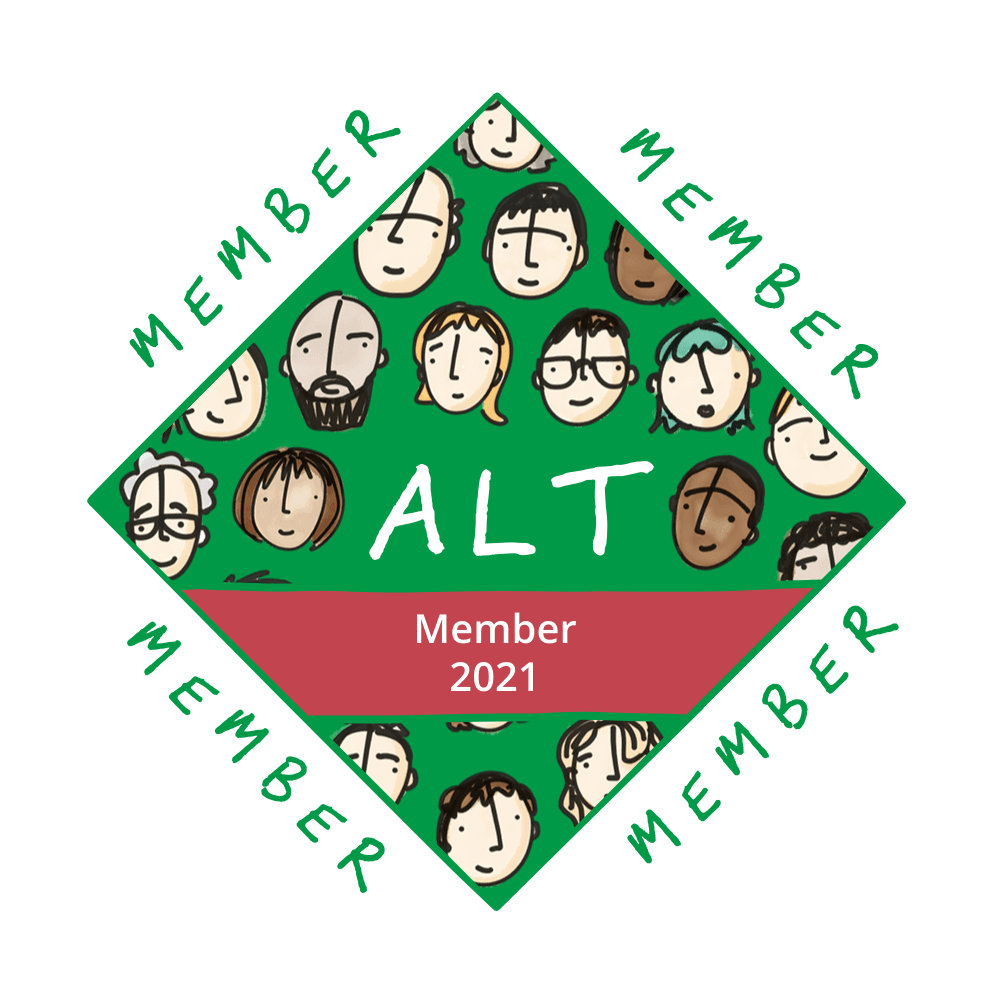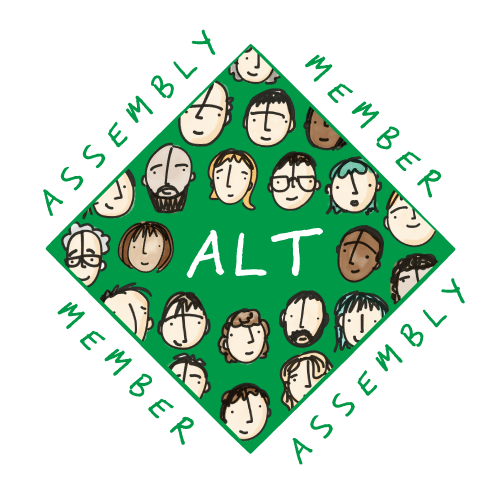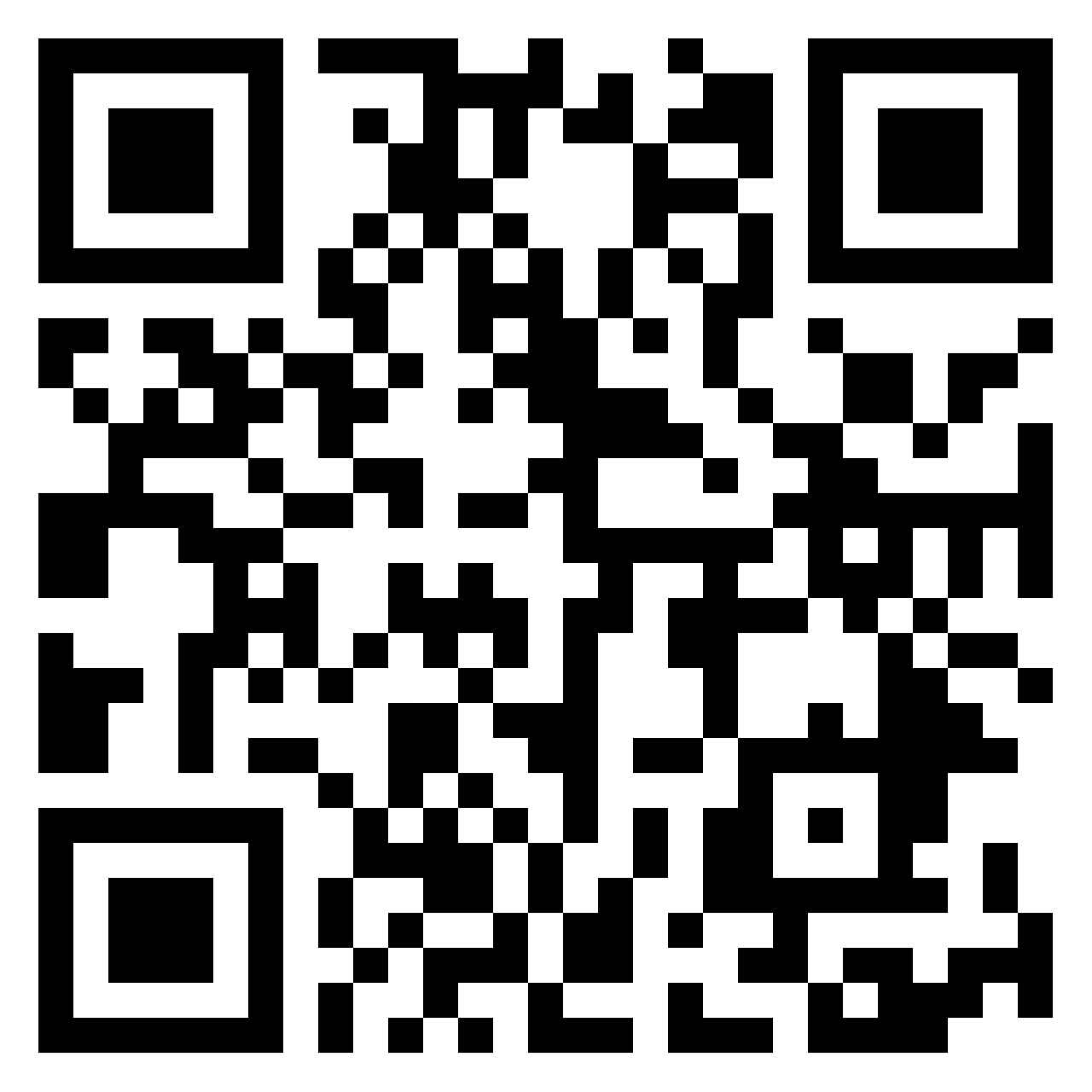Invited Keynote presentation for the Queensland Allied Clinical Health Education Forum Friday 3rd November 2023: CLINICAL EDUCATION AND THE DIGITAL AGE

QR code link to the PADLET presentation.
Weblog about using mobile devices and social software in higher education
Invited Keynote presentation for the Queensland Allied Clinical Health Education Forum Friday 3rd November 2023: CLINICAL EDUCATION AND THE DIGITAL AGE

QR code link to the PADLET presentation.
While it’s been a bit quiet here on my personal WordPress Blog lately – I have been busy establishing the University of Melbourne SoTEL Research Network and posting to our Blog space there: https://blogs.unimelb.edu.au/sotel/

Check the UniMelb SoTEL research network Blog for lots of updates and links to research!
The Association for Learning Technology (ALT, UK) have been rolling out a model of awarding and distributing Open Badges that recognise active contribution to the society and membership, utilising the Open Badge Factory. Here’s an example of an Open Badge Factory Passport that displays your collection of Open Badges:
https://openbadgepassport.com/app/profile/117687
The two badges have the following descriptions:

Association for Learning TechnologyCheck this badge…
This badge is issued to current members of the Association for Learning Technology. The Association for Learning Technology (ALT) is the leading professional body for Learning Technology in the UK. We represent individual and organisational Members from all sectors including Further and Higher Education and industry.
We provide recognition and accreditation for all with a professional interest in Learning Technology. We work across the UK and internationally to:
Our overall charitable objective is
“to advance education through increasing, exploring and disseminating knowledge in the field of Learning Technology for the benefit of the general public”.
Our core activities are focused on membership services that help us achieve our strategic aims and generate the majority of ALT’s income as an independent charity. Find out more about ALT

This badge is issued to ALT (Association for Learning Technology) Assembly Members who have actively participated in the committee. The ALT Assembly was established in 2019 and is the overarching committee advising the ALT Board of Trustees.Check this badge…
The ALT Assembly is chaired by the President of ALT and serviced by the Membership and Professional Development Manager. It provides greater representation of Members and in particular Member groups.
The role of the Assembly is to:
Who is a Member of the Assembly?
The Assembly works openly and collaboratively.Participation is welcomed from Members currently involved in:
Building on a conversation during my facilitation of the #EDUC90970 “Facilitating Online Learning” graduate certificate in undergraduate teaching elective, the participants and I collaboratively generated a conversation that began with critiquing the concept of fostering communities of inquiry to a process of double loop learning about heutagogy and its relationship to the principles of early childhood education (e.g. Montessori). This exploration of the concepts of Heutagogy filtered through into the design of participants prototype online courses. While there were some very creative course design proposals developed, the implementation of heutagogical principles for activity and assessment design were mitigated by conceptions of the scale of the shift in thinking for both lecturers and students and institutional support to enable these changes, particularly in large first-year cohorts – although there were some creative course designs at scale. In particular there seemed to be a continued reticence to build learner-generated contexts into the proposed course designs. While most course designs were creative in the design of a move away from high-stake summative exams and large essays as assessment activities towards more timely formative feedback and collaborative student projects, very few implemented student-generated ePortfolios or collaboration beyond the confines of the LMS (Learning Management System). Institutional change requires a significant catalyst, and not merely a momentary change or the viscosity and elasticity of the structures and procedures will simply reabsorb any changes after the catalyst is removed. However, in the on-going age of COVID19 (post-covid19 statements seem somewhat premature at present) there is a significant catalyst for transformative change for how educational systems and institutions engage with technology and the new pedagogies that new technologies enable – in light of this my question is:
What if higher education actually focused upon the principles of Heutagogy: developing creativity, collaboration, open educational research and practice and building authentic learning communities?
Higher education could:
Bibliography (Sources of inspiration and further reading):
Ecclesfield, N., & Garnett, F. (Eds.). (2021). Digital Learning: Architectures of Participation. IGI Global. https://doi.org/10.4018/978-1-7998-4333-7
Moore, R. L. (2020, 2020/07/02). Developing lifelong learning with heutagogy: contexts, critiques, and challenges. Distance Education, 41(3), 381-401. https://doi.org/10.1080/01587919.2020.1766949
Blaschke, L. M., & Hase, S. (2019). Heutagogy and digital media networks: Setting students on the path to lifelong learning. Pacific Journal of Technology Enhanced Learning, 1(1), 1-14. https://doi.org/https://doi.org/10.24135/pjtel.v1i1.1
Hase, S., & Kenyon, C. (2007). Heutagogy: a child of complexity theory. Complicity: an International Journal of Complexity and Education, 4(1), 111-118. https://doi.org/doi.org/10.29173/cmplct8766
Hase, S., & Kenyon, C. (2001). From Andragogy to Heutagogy. ultiBASE Articles(December), 1-10. http://www.psy.gla.ac.uk/~steve/pr/Heutagogy.html
Montessori, M. (1948). The discovery of the child (2004 ed.). Aakar Books. http://www.amazon.com/gp/search?index=books&linkCode=qs&keywords=8187879238
Narayan, V., Herrington, J., & Cochrane, T. (2019). Design principles for heutagogic learning: Implementing student-determined learning with mobile and social media tools. Australasian Journal of Educational Technology (AJET), 35(3), 86-101. https://doi.org/10.14742/ajet.3941
My first draft of using the free online version of PK Create to make a short (6’40”) summary of my MCSHE Technology Enhanced Learning research program activity so far. It was more time consuming than I thought to record the audio to the slides, and there is an annoying audio ‘click’ at the start of each slides’ audio – next time I think I’ll record the audio separately and attache to the slides rather than use the web-based record function which seems rather low quality and noisey. A bit of an experiment to see the potential of this format for future online presentations and symposia.
https://www.pechakucha.com/presentations/mcshe-tel-research-update
Intro notes for today’s @MelbCSHE #TheNewNormal Webinar: “From emergency to emergent practice: What we’ve learned about interaction and engagement” https://spark.adobe.com/page/nqIAceswhxl3Y/?w=4_1190 #adobespark @cdeneen212 @briansology @CatManning Join the discussion @ https://melbourne-cshe.unimelb.edu.au/programs/teaching-and-learning/the-new-normal-engaged-teaching-and-learning-webinar-series
https://spark.adobe.com/page/nqIAceswhxl3Y/?w=4_1190

Testing Twitter link and autosharing and embedding #EDUC90970 Map
This week we discussed an ecology of mobile resources that we have found useful in facilitating remote working and collaboration during COVID-19 – curated in a Padlet https://padlet.com/thomcochrane/5d4lsp3u1hrh3nw0

The #EDUC90970 community of inquiry conversation exploring facilitating online learning has started!
https://twitter.com/i/events/1265117495993618433?s=13
You must be logged in to post a comment.